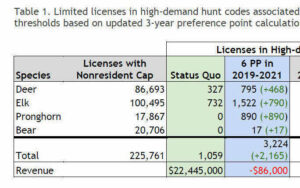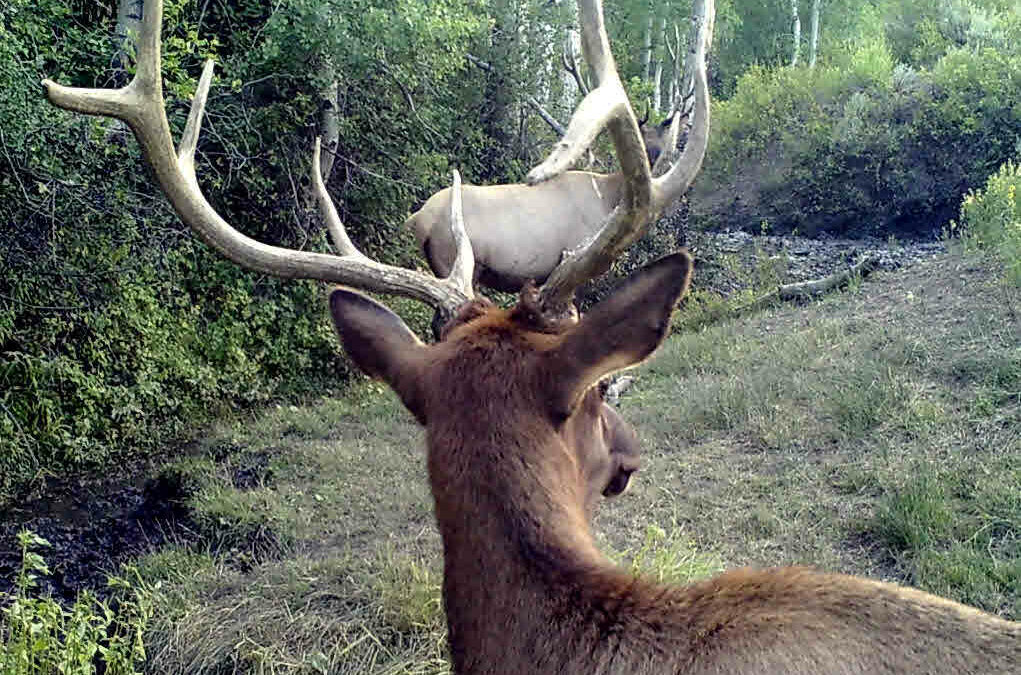According to the Colorado Resident Hunter Association Facebook Page and this November 2022 CPW Commission Report, the resident hunters of Colorado recently were able to help convert over 2000 big game tags to the 80/20 (resident/nonresident) tag allocation by participating in roundtables and commenting. Of this, 1258 were for deer and elk limited draw tags will go from 65/35 to 80/20. Ultimately resident hunters will gain about 200 coveted limited elk and deer tags each year, which previously were being funneled to nonresident hunters by using big game draw data from 2007. Can you imagine using data that is 16 years old to determine which Colorado hunting units give 35% of their tags to nonresidents and which give 20%? Don’t forget, all the other western states give only about 10% of limited big game tags to non-residents.

Recently the Colorado Parks and Wildlife (CPW) and the CPW Commission worked to right a wrong perpetrated on the resident hunters of Colorado for years. In a digital/tech era, one can only imagine that this computer data fix took the CPW about 30 minutes to correct. For years Colorado resident hunters have been losing out on hundreds/thousands of trophy deer and elk tags by not updating which hunt units currently took more than 6 preference points to draw. 1,258 limited deer/elk tags have gone from less than 6 points to over 6 points in the past 16 years. Instead of 35% of these coveted tags going to nonresidents, now only 20% will go to nonresident hunters. See Table 1.
After the November 2022 CPW Commission meeting in Gateway Colorado, the CPW hunting regulations now read as follows: Nonresident hunter drawing limitations (first choice applications only)
2.Unless there is an insufficient number of resident applications, nonresident hunters shall receive no more than 35% of available deer, elk, bear and pronghorn licenses for hunt codes requiring fewer than six preference points for resident hunters to draw in the regular drawing, and no more than 20% of available deer, and elk, bear and pronghorn licenses for hunt codes requiring six or more preference points for resident hunters to draw in the regular drawing as calculated using a rolling three-year average for the previous three limited license draws with a one year lag. These drawing limitations do not apply to the issuance of Private Land Only and Ranching for Wildlife licenses.
It’s also good to see Colorado has finally added Pronghorn and Bear to the limited draw tag allocation caps. This was brought up in a previous article on this website, No State Treats Resident Hunters Worse than Colorado.
The CPW Commission did a great job righting a wrong for resident hunters of Colorado. The next step in 2023, resident hunters will work together to permanently remove all nonresident unlimited Over-the-Counter (OTC) elk licenses in Colorado to prevent further overcrowding during our big game hunting seasons. Only Colorado residents should be awarded unlimited OTC Elk tags in Colorado. We have an obligation to protect our youth resident hunters and all future generations of resident hunters in Colorado.
When a state owns legislative jurisdiction over something that means the residents of that state generally “own” it. Colorado holds legislative jurisdiction over tag allocation within its borders and yes we are a sovereign state just like the other 49 states. Only 3% of Colorado’s federal lands are a federal enclave where hunting is not allowed (Example –in 1929 Colorado ceded exclusive jurisdiction over the Rocky Mountain National Park (RMNP) making it the largest federal enclave in Colorado). Hunting is not allowed in RMNP and the state/sheriff has no jurisdiction within the national park). If you are a public land hunter or a resident in a county that has federal lands and you don’t understand what a federal enclave is, please spend some time on this website and learn. You would be surprised that very few of our elected representatives really understand what a federal enclave is or how they are procured. Nonresidents have an equal right to visit Colorado’s 23.5 million acres of federal lands (1/3 of CO) but Colorado residents own the hunting rights that Colorado legislates over. All Western states set the tag allocations within their borders for private and federal lands that are held in a Propreitorial Interest Only by the federal government. Most western states have more federal land than Colorado and set those tag allocations at 10% for nonresidents. When you hear someone on the CPW commission talking about nonresidents having hunting rights in Colorado because of federal lands, you need to be able to educate them and remind them that Colorado owns the legislative jurisdiction over tag allocation. Colorado state representatives, CPW, and the CPW Commission have an obligation to treat resident hunters in Colorado with the same resident hunter equity as other western states.
Currently, 3 out of 5 archery elk OTC hunters within the 5 Grand Mesa hunting units are nonresidents. No other state in the west or in the country treats its resident hunters like this. We have sold out resident hunters to increase revenues and we must work to fix this. Since 2014, as a result of overcrowding, resident archery OTC and resident rifle OTC hunters have been on the decline (12-20%). Colorado needs to encourage future generations of Coloradoans to participate in their right to hunt in the state where they live. Let’s not forget that Colorado’s population has doubled from 3 million to over 6 million since 1990.
Disclosure -The data within this article is from various sources (CORA, CPW website, online research, and print). Some data can be very fragmented to collect. All info is subject to errors and you should verify all numbers with your own research. It is desired that CPW someday validate this information to share the trends of Western states compared to Colorado to show the equity status for the resident hunters.

